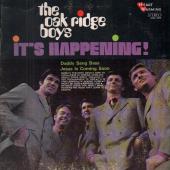No albums list this artist in credits. You are able to edit albums and add credit info if you have created an account.
| Award Organization | Year | Award Name | Album |
|---|---|---|---|
| GMA Dove | 1970 | Male Group of the Year | |
| GMA Dove | 1969 | Album Jacket | It's Happening |
| GMA Dove | 1969 | Album of the Year | It's Happening |
The Oak Ridge Boys are an American country and gospel vocal quartet. The group was founded in the 1940s as the Oak Ridge Quartet. They became popular in southern gospel during the 1950s. Their name was changed to the Oak Ridge Boys in the early 1960s, and they remained a gospel group until the mid-1970s, when they changed their image and concentrated on country music.
The core group that would eventually lead to the Oak Ridge Boys was a country group called Wally Fowler and the Georgia Clodhoppers, formed in 1943 in Knoxville, Tennessee. They were requested to perform for staff members and their families restricted during World War II at the nuclear research plant in nearby Oak Ridge, Tennessee. They were asked to sing there so often that eventually they changed their name to the Oak Ridge Quartet. And because their most popular songs were gospel, Fowler decided to focus solely on southern gospel music. At the time, the quartet was made up of Wally Fowler, Lon "Deacon" Freeman, Curly Kinsey, and Johnny New. This group began recording in 1947. Wally Fowler And The Oak Ridge Quartet were members of the Grand Ole Opry in the 1940s. In 1949, the other three men split from Fowler to form a new group, Curley Kinsey and the Tennessee Ridge Runners, so Fowler hired an existing group, the Calvary Quartet, to re-form the Oak Ridge Quartet. In 1957, Fowler sold the rights to the "Oak Ridge Quartet" name to group member Smitty Gatlin in exchange for forgiveness of a debt. As a result of more personnel changes, the group lost its tenor, so they lowered their arrangements and had Gatlin sing tenor while the pianist, Tommy Fairchild, sang lead. They recorded an album for Cadence Records, then in 1958 they hired Willie Wynn to sing the tenor part, Fairchild moved back exclusively to the piano. At this point, the group consisted of Fairchild at the piano, Wynn, Gatlin (singing lead), baritone Ron Page, and bass Herman Harper. They recorded an album on the Checker Records label, one on Starday, and three on Skylite. In 1961, Gatlin changed the group's name to "the Oak Ridge Boys" because their producer, Bud Praeger, thought "Oak Ridge Quartet" sounded too old-fashioned for their contemporary sound.
In 1962, Ron Page left, and the group hired Gary McSpadden (who had filled in for Jake Hess in the Statesmen Quartet) as a baritone with the understanding from Jake Hess that when he was ready to start a group, he would recruit McSpadden. They recorded another album on Skylite, and then two groundbreaking albums on Warner Brothers. When Hess followed through on that promise, McSpadden quit to join a new group Hess was forming, the Imperials. Jim Hammill (who later became a mainstay in the Kingsmen Quartet) was chosen to be his replacement. They made one album for Festival Records, one for Stateswood (Skylite's budget label), and two more for Skylite. Hammill did not get along with the rest of the group, and William Lee Golden, a newcomer to the music industry, felt that Hamill was hurting the group and asked the group if he could be Hammil's replacement. After Hamill's retirement from the group in 1964, Golden joined as baritone.
The group recorded another album for Starday and another on Skylite in 1965. In 1966, Gatlin left the group to become a minister of music and, on Golden's recommendation, Duane Allen, formerly of the Southernairs Quartet (and more recently baritone of the Prophets Quartet), was hired to replace him. With Willie Wynn still singing tenor and Herman Harper as bass, the group made another album for Skylite, one for United Artists, and then began recording on the Heart Warming label. Between 1966 and 1973 they made 12 albums with Heart Warming, and the company also released several compilation albums on which they were included during those years. The group also had an album on Vista (Heart Warming's budget label) that included unreleased songs from previous sessions. Harper left the group in 1968 to join the Don Light Talent Agency, before starting his own company, The Harper Agency, which remains one of the most highly-reputable booking agencies in gospel music. Noel Fox, formerly of the Tennesseans and the Harvesters, took over the bass part. In 1970, the Oak Ridge Boys earned their first Grammy award for "Talk About the Good Times".
In late October 1972, Richard Sterban, the bass with J.D. Sumner and the Stamps Quartet left that group and joined the Oak Ridge Boys. This closely followed what was possibly the Stamps Quartet's most famous moment, backing Elvis Presley in his 10 June 1972 concert at Madison Square Garden. The quartet that appeared on "Hee Haw" in 1972 consisted of Willie Wynn, Duane Allen, William Lee Golden, and Richard Sterban. Joe Bonsall, a Philadelphia native who was a member of the Keystone Quartet and recording on Duane Allen's Superior label, joined in October 1973 (coincidentally, both Sterban and Bonsall had been members of the Keystones during the late '60s, recording much of the ORB's material). That same year the Oak Ridge Boys recorded a single with Johnny Cash and the Carter Family, "Praise the Lord and Pass the Soup", that put them on the country charts for the first time. The group's lineup would remain consistent for the next 15 years.




